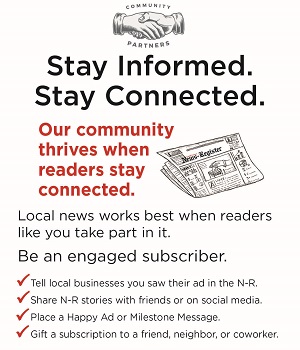Schuck: Finding good stuff amid heaps of data
Guest writer Eric Schuck holds a Ph.D. in economics from Washington State University and a professorship in economics at Linfield University. He’s twice been honored with Fulbright Fellowships to work and study abroad, once in South Africa and once in Lebanon. An officer in the Navy Reserve, he’s also served a pair of active-duty military tours in the Middle East. He makes his home in McMinnville with his wife and three children.
Sitting in the computer lab with my students, I leaned back on my stool in awe at what they were accomplishing. With unparalleled access to data and computing power, they were now executing analyses that even five years ago took the assets of a major research university.
It’s pretty amazing. It’s also deeply sobering.
While they can access information and employ techniques that historically were the exclusive province of Ph.D.s, making sense of it all is a whole different issue. Ensuring that students understand what they create sufficiently to interpret the results appropriately and responsibly takes on even greater importance.
Increasingly, teaching requires less emphasis on the “hows” of research and more on the “whats” — what matters, and what does it mean? This is where methodology comes into play.
Methodology is a tricky thing. To start, it suffers from the “Inigo Montoya” problem.
Most people use the word incorrectly. Simply put, methodology is the study of methods. That is, it is an examination of tools.
Confronted with an unparalleled ability to access and organize information, learning the strengths and weaknesses of various techniques and methods, and appraising what each can and cannot do, matters more than ever.
Students need to learn how to sort out the junk. Everyone does.
Ironically, the best sign people can do this is a paradox. Students become simultaneously more sure and less certain.
With a better appreciation of how information was created, there is greater confidence in why a specific conclusion is reached. At the same time, understanding techniques creates a healthy appreciation of the true limits of what is known.
In practice, this usually means the more we know about something, the longer the list of caveats. That’s worth remembering, and not just in a classroom setting.
When reviewing research, provisos and doubt often reflect not ignorance, but self-awareness. And that’s a good thing.
Unfortunately, these traits do not always receive the respect they are due. Too often, society treats measured statements and limited conclusions as failures.
This is where the problems start. Unable to embrace nuance, people seek certainty where there is none. And with a world of information only an internet search away, certainty is what people find, regardless of how flawed, imperfect and unreliable that certainty may be.
Worse still, absent an appreciation for methodology, people lack the critical skills necessary to conduct truly open inquiry. Instead, “doing research” devolves to conducting targeted searches aimed solely at shoring up existing biases and assumptions.
Socially, this is bad, as sketchy research skills lead to sketchy public policy outcomes. And avoiding this takes conscious effort.
Most people won’t have some nagging professor sitting on a stool in a computer lab reminding them of the limits of what they really know. However, it is still possible to achieve the same effect.
For starters, learn to vet sources. Material that cannot be cross-validated, or lacks transparency in the when, where and how it was generated, should give pause.
Quality research always — always — leaves a paper trail. Learn to look for one in others’ research and create one in your own.
Maintaining a healthy sense of skepticism represents an appropriate additional safeguard. Asking questions is important, especially when research results in singular or absolutist conclusions.
Beware research that guarantees a single, definitive answer. The world is usually more complicated than that.
Finally, accept the fact things change.
Research is a cumulative process. We add and subtract information as we go along, and that’s OK.
Unlearning something that is either no longer relevant or operative can and always will be the price of progress.











Comments